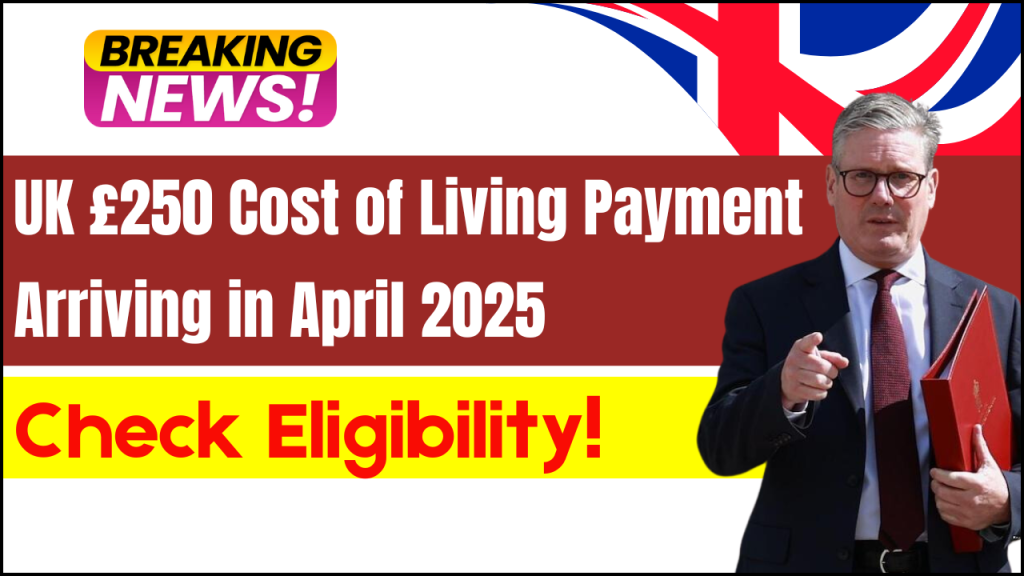
The UK government has recently announced a one-time £250 payment to help vulnerable households manage rising living costs. This support measure will be distributed in April 2025 through the Household Support Fund (HSF), which has been extended until March 2026. The payment aims to provide financial relief to those struggling with inflation, high energy bills, and increasing food prices.
Who Can Receive This Support?
The payment targets several groups facing financial challenges:
- Benefit Recipients – People receiving means-tested benefits like Universal Credit, Income Support, Pension Credit, various forms of Jobseeker’s Allowance, Employment and Support Allowance, and Tax Credits will likely qualify automatically.
- Elderly Population – Pensioners who receive Pension Credit will automatically qualify. Those above State Pension age but not receiving Pension Credit might consider applying, as this could open doors to additional support.
- People with Disabilities – Individuals receiving disability benefits such as Personal Independence Payment (PIP), Attendance Allowance, or Disability Living Allowance (DLA) may be eligible, though some local councils might require additional proof of medical needs.
- Low-Income Households – Even without benefits, households with income below certain thresholds may qualify. Councils typically assess savings (often must be below £2,000), monthly expenses, and number of dependents.
Distribution Methods and Application Process
| Distribution Method | Who It Applies To | What You Need To Do |
|---|---|---|
| Automatic Transfer | Most benefit recipients | Nothing – payment will arrive automatically |
| Manual Application | Those not on benefits but facing hardship | Apply through local council website |
For those needing to apply manually, the process typically involves:
- Assessing your financial situation
- Finding your local council through gov.uk
- Searching for Household Support Fund information
- Gathering necessary documents (proof of income, ID, utility bills)
- Submitting your application
- Waiting 2-6 weeks for processing
The Broader Context of Financial Support
This payment is part of a wider government strategy to address the ongoing cost-of-living crisis in the UK. With economic challenges persisting post-pandemic, many households continue to struggle with basic expenses. The £250 payment represents an acknowledgment that targeted financial assistance remains necessary for vulnerable groups.
Local councils play a crucial role in this support system, as they have the flexibility to distribute funds based on the specific needs of their communities. This localized approach allows for more tailored support, though it can also create some variation in eligibility criteria across different regions.
Additional Support Programs
The £250 Cost of Living Payment works alongside other support measures:
- Winter Fuel Payment – Provides £250-£600 for pensioners to cover heating costs
- Cold Weather Payment – Offers £25 for each 7-day period of freezing temperatures
- Warm Home Discount Scheme – Gives £140 off electricity bills for eligible households
- Council Tax Support – Reduces council tax bills for low-income residents
About the Household Support Fund
The Household Support Fund was initially established in 2021 as a response to the economic fallout from the COVID-19 pandemic and the global energy crisis. It has since been extended multiple times, demonstrating its importance in the UK’s social safety net. The fund is administered by local authorities who receive allocations from the central government to distribute to residents in need.
The recent extension until March 2026 highlights the government’s recognition that financial hardship continues to affect many households despite broader economic recovery efforts. By providing this dedicated funding stream, the government aims to ensure that local councils can respond to the specific challenges faced by their communities.
Common Queries
1. Will the £250 payment affect my other benefits?
No, the Cost of Living Payment is a one-off payment that does not count as income for benefit assessments. Receiving this payment will not reduce your regular benefit entitlements.
2. What if I don’t automatically qualify but still need financial help?
If you don’t receive qualifying benefits but are experiencing financial hardship, you should contact your local council directly. Many councils have discretionary funds available for residents facing difficulties, and they can advise on the application process.
3. When exactly in April 2025 will I receive the payment?
Payment dates may vary depending on your local council and benefit status. Those receiving automatic payments will likely see them in early to mid-April, while those applying manually may experience longer waiting times. For specific timing information, check your local council’s website or contact their support line.